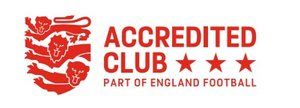Follow Us
JOIN OUR CLUB
Want to know more about joining us?
Click the link below to find a team
Code of Conduct -
Parents
A child’s parents have perhaps the greatest influence on their fun and progression in football. While the team manager can help to improve a player’s technique, it is the parent who has the biggest impact on the player’s attitude, ambition and desire.
Most parents have good intentions when supporting and helping their child to develop, though at times can get carried away and are emotionally caught up in the moment of the match. We have all heard the pushy parent shout and scream on the touchline, barking out instructions to their child, while failing to see that there are a number of other players in the team, and where this behaviour may seem as encouragement to them, it very often has the opposite effect, both for their own child and the team mates around them.
What is wrong with a parent giving encouragement and instructions to their child from the touchline ? Many keen and interested parents do this but, there’s a difference between encouraging a child and telling them what they should have done. Some parents find it a lot easier to tell a child their mistakes rather than encouraging them on their good play.
The next time you are at a junior football match, listen to yourself or nearby parent and make a note of how often you encourage or instruct ? Despite all the best intentions the pressure the parent puts the child under and themselves can have a negative effect and cause the player’s performance to drop, and in the worst case cause the young player to give up the game completely. This is not as uncommon as it may seem, and there is a long list of very good young footballers no longer playing, not because of their lack of ability but because of parent pressure for them to do well.
It is not easy, but parents have a very important role in the development of the youth footballer. It’s important that the parent listens to the child’s needs and understands they are growing both physically and emotionally. The parent needs to be supportive by encouraging and not be critical or point out faults.
*The above has been taken from Huddersfield JFL Website
Parents have a great influence on children’s enjoyment and success in football. Children play football because they first and foremost love the game – its fun. It is important to remember that however good a child becomes at football, positive encouragement will contribute to:
- children enjoying football
- a sense of personal achievement
- self-esteem
- improving the child’s skills and techniques.
A parent’s expectations and attitudes have a significant bearing on a child’s attitude towards:
- other players
- officials
- managers
- parents.
1. Exhibit good sportsmanship at all times, never condone violations of the laws of the game or exhibit behaviour contrary to the spirit of the laws of the game
2. Remember that children should be playing football primarily for their own enjoyment. Do not put pressure on the children
3. Place the well-being and safety of each player above all other considerations
4. Encourage your child, and others, or be quiet. Praise effort and performance, not results
5. Parents must encourage and guide players to accept responsibility for their own behaviour and performance
6. Stand well back when watching matches and stay behind any barriers or lines that are designated for that purpose and do not stand behind the goals
7. No offensive, abusive or insulting remarks shall be made toward any player, official, or parent
8. Parents must develop an appropriate supportive relationship with both the manager/coach and their child based on mutual trust and respect
9. Parents should seek clarification of exactly what is expected of them and what they are entitled to expect from the coach
10. Discuss any concerns about training or matches with the coach or manager in private
11. Respect the referees decisions at all times and avoid words or actions which may mislead a Match Official
12. Ensure that your child arrives at the designated location for matches or training at the time requested by the manager or coach
13. Inform the manager if there has been a change in your child’s medical condition
14. Ensure that suitable kit is worn by your child
15. Keep club facilities, including kit, in good condition
16. Ensure that all requisite forms are filled in correctly
17. Pay any subscriptions or fees on time
18. Support the coach’s decisions and discuss any concerns directly with the coach.
Failing to follow the Codes of Conduct could result in Linthwaite Football Club or the County FA taking actions against Players or Parents.

Follow us

© 2024 All Rights Reserved | Linthwaite Football Club


















